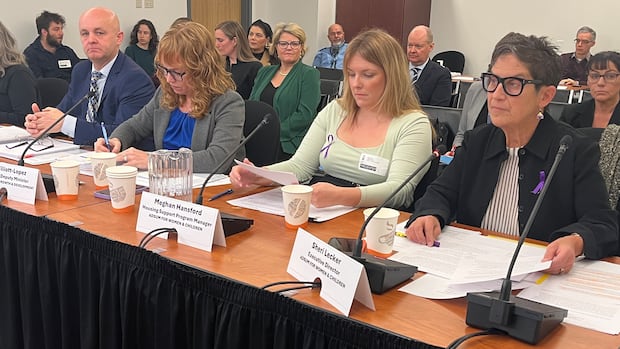Nova ScotiaA senior official with the Nova Scotia government says they’re willing to look at expenses non-profit groups have incurred trying to help clients whose assistance applications to the province are being delayed.Adsum Women and Children spent $77,000 covering rent amid supplement application delaysMichael Gorman · CBC News · Posted: Nov 12, 2025 2:05 PM EST | Last Updated: 2 hours agoListen to this articleEstimated 4 minutesThe audio version of this article is generated by text-to-speech, a technology based on artificial intelligence.Witnesses at the pulic accounts committee included Sheri Lecker, from right, and Meghan Hansford from Adsum Women and Children, and Vicki Elliott-Lopez and Chris Morrissey from the Growth and Development Department. (Michael Gorman/CBC)A senior official with the Nova Scotia government says they’re willing to look at expenses non-profit groups have incurred trying to help clients whose assistance applications to the province are being delayed.During a meeting of the legislature’s public accounts committee on Wednesday, the executive director of Adsum Women and Children said last year the organization spent $77,000 to help low-income people while they experienced delays in having rent supplement applications processed.Sheri Lecker said her organization is providing people with money while they wait on the province to ensure they can afford to either get a new place or maintain the place they’re already in. Since April, they’ve spent an additional $32,000 covering gaps in program payments, a third of which relate to rent supplements.While the standard for processing is supposed to be within two weeks, Lecker told MLAs on the committee that delays can stretch for eight to 12 weeks.“That’s too long if they are trying to access housing because that housing will go to somebody else who has the money now,” she said.“And landlords tell us that if they don’t have a good experience or they have repeated not good experiences, they don’t want to participate anymore.”’I would agree it’s not fair’Chris Morrissey, the deputy minister of Growth and Development, told reporters after the meeting that he’s ready to discuss the issue with service providers.“I would agree it’s not fair that this is a burden for some of these organizations, so we’ll have a meeting with some of those folks and see what we can do with respect to correcting this,” he said.Morrissey told the committee that the government is spending almost $74 million on rent supplements to help about 9,600 households. The number has steadily increased in recent years as the province continues to face high demand for affordable housing and not enough supply to meet that demand.He said efforts are being made to address the delays, including the creation of an online application process and a centralization of document collection, but Morrissey could not pinpoint why the rent supplement program is experiencing such delays.A call for more non-market housingMorrissey, Lecker and other witnesses agreed that no single approach will solve the housing issue, but Lecker said much more emphasis needs to be placed on building, maintaining and renovating housing that is considered truly affordable.The definition of affordable that Adsum uses, which is the same as the Canadian Housing and Mortgage Corporation, is no more than 30 per cent of pre-tax household income.If people with low incomes are paying more than 30 per cent, Lecker said it’s taking away from other expenses such as medication and food.Officials at Adsum are advocating for the creation of more non-market housing. The organization owns or operates upwards of 140 units with rents geared to income.No profit, but stabilityWhile rent supplements can help people stay where they are or find a place they might not otherwise afford, Lecker said the long-term solution is to preserve existing affordable housing, repurpose space that becomes available and work with non-profits to develop new stock.She noted that a recent report from the federal housing advocate said one-third of new housing starts need to be geared toward low and very low income brackets.“It’s not easy work and it’s not work that private developers will engage in,” Lecker told the committee.”There’s no profit to be made here when rents are $285 or $321 a month. There’s no profit, but what we have is stability and community for our fellow Nova Scotians.”MORE TOP STORIESABOUT THE AUTHORMichael Gorman covers the Nova Scotia legislature for CBC, with additional focuses on health care and rural communities. Contact him with story ideas at michael.gorman@cbc.ca
N.S. to consider reimbursing service providers for covering program processing delays











